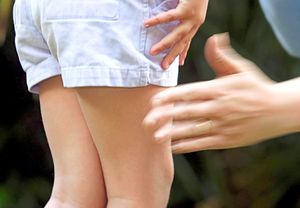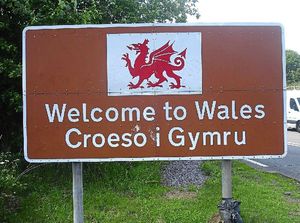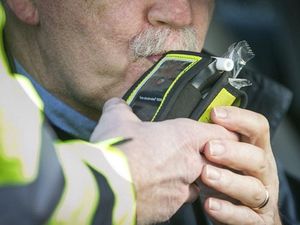Smacking children to be made illegal - on Welsh side of the border
Smacking children is likely to become illegal in Wales – leading to the prospect of families on the Shropshire border living under different rules.

People in Wales are set to be asked their views on the Welsh government’s plans to ban the smacking of children.
If implemented, the ban would make Wales the second area of the UK to end the physical punishment of children after the Scottish Government announced its plans to remove the defence of “justifiable assault’’ in Scots law, which allows parents to use physical punishment to admonish a child.
But there are no plans to change the law in England, leading to possible confusion on the Shropshire-Mid Wales border where neighbourhoods could be split in two.
In Wales, the government plans to remove the defence of reasonable punishment to the offences of battery and assault.
Launching a 12-week consultation on the issue, the minister for children and social care, Huw Irranca-Davies, said the ban would be part of a wider package of measures to support children to have the best start in life.
“We want parents in Wales to be confident in managing their children’s behaviour without feeling they must resort to physical punishment,” he said.
“If there is any potential risk of harm to a child then it is our obligation as a government to take action.
“Legislation was introduced many years ago to stop physical punishment in schools and childcare settings – now is the time to ensure it is no longer acceptable anywhere.”
Mr Irranca-Davies said he was aware there were differing views on the legislation and that the consultation, which closes on April 2, would provide everyone an opportunity to have their say.
The proposed legislation would not result in the creation of a new offence but would instead remove a defence to the existing offences of assault and battery, meaning an adult looking after a child would no longer be able to use physical or corporal punishment against them.
Mr Irranca-Davies added: “As a parent of three boys myself, I know being a parent can sometimes be a challenging experience. Children do not come with an instruction manual and sometimes parents need guidance and support to help them raise healthy and happy children.”
He said it was now known that physical punishment could have “negative long-term impacts on a child’s life chances” and was an “ineffective punishment”.
A spokesman for NSPCC Cymru said the charity had long campaigned for children in Wales to have the same protection against assault as adults.
“We welcome the steps being taken towards removing the defence of ‘reasonable punishment’,” he said.
“Doing so is a common-sense move which is about fairness and equality for children.
“It is wrong that a defence which does not exist in a case of common assault against an adult can be used to justify striking a child.
“Closing this loophole will bring Wales in line with dozens of countries around the world and finally give our children equal protection under the law.”
Other countries that have already made the change include France, Sweden, Norway, Denmark and Ireland.
Sally Holland, the Children’s Commissioner for Wales, said the proposed legislation, if accepted, would mean Wales was leading the way “yet again in protecting children’s rights”.
“There has been a lot of misinformation circulating during debates about this topic over recent months,” she said.
“Here are the facts: Welsh Government does not want to create a new criminal offence.
“Welsh Government does not want to criminalise parents.
“What Government does want to do is to ensure children living in Wales are afforded the same protection in the law as adults. Hitting or smacking a child is never loving or caring.”
Ms Holland said she hoped many parents and carers would take the time to read the proposals so they could be reassured that this was not about turning good parents into criminals or telling them how to parent but about providing the same protection for children in Wales.
Ruling could be the latest border division

Smacking children could become the latest in a string of laws that has divided England and Wales.
People living in Wales are set to have their say on whether parents should be allowed to smack their children as a form of discipline.
It leads to the prospect of another divide for communities that live on the Shropshire-Mid Wales border.
People living in Wales already benefit from free prescriptions on the NHS, while in England it is charged. However, there’s added confusion because anyone living in England will also get free medication as long as it is dispensed by a Welsh pharmacist. And at one time, Welsh counties were referred to as wet or dry depending on whether people could drink in pubs on Sundays. When Montgomeryshire was dry it was legal to drink on Sundays in the two English bars but not the Welsh bar.
Wales also has a tradition of going its own way. The charge for plastic bags in shops was brought in for Wales years before England followed suit. Children in Wales are allowed some term time off for holidays, but parents are likely to be fined over the border in England. In 2007 there was also three months where people could smoke in public places in England but not in Wales.
The Welsh Government implemented a ban in April but it wasn’t until July that a similar law came into effect over the border.
Powys County Councillor Peter Lewis, who lives on the Shropshire-Wales border in Llanfyllin, said the latest proposal could potentially confuse people.
“The law should be the same for both countries. It doesn’t make sense that you’d be able to smack your child in Shropshire but not over the border in Wales. I’m not saying it’s a law I believe in but it could cause confusion,” he said.
Don’t demonise parents with ban, says expert
Dr Ashley Frawley, senior lecturer in social policy at Swansea University, says her experience of marginalised groups has led her to defend the right to smack.
She wrote an article on the subject when a smacking ban was first mooted for Wales, explaining: “I am sticking my head above the parapet to defend the right of parents.”
She said she had received threats for her views, but felt the need to speak out, adding
that contemporary UK parenting culture regards poor and working class parents with suspicion and as “morally suspect”. Dr Frawley said: “There’s an implicit sense only middle class people who’ve ‘consulted the literature’ are really capable of the tough business of raising children.
“In my view, this is the deliberate result of policies by a white, middle-class elite thinking they know best, and so too is this move to ban smacking.
“People may think I am exaggerating, but I know exactly who a ban will disproportionately impact – and it is the migrant families, the poor and the working-classes who are already over-represented in numbers of children in care. More than this, though, it is promoting the view that states know best – something I feel is very dangerous and difficult to stand up to.
“Increasingly, it seems the democratic will of the people and parents counts for nothing. It used to be parents, and particularly mothers, were sources of information on the raising of children, but now they are morally judged and pilloried for trying to do their best.
“People simply do not realise that if this ban is enforced, it will criminalise parents for disciplining their own children. Children will be taken away or put on an at-risk register, parents will be hauled to court, and it will not be the case of ‘innocent until proven guilty’.
“In fact, it will greatly damage the home life of those involved – and that damage will be much greater than the effect of any smack. It is a messy and difficult business, but wedging the state and a host of self-styled ‘experts’ between parents and children sucks the joy out of it and transforms family life into a series of techniques.”




